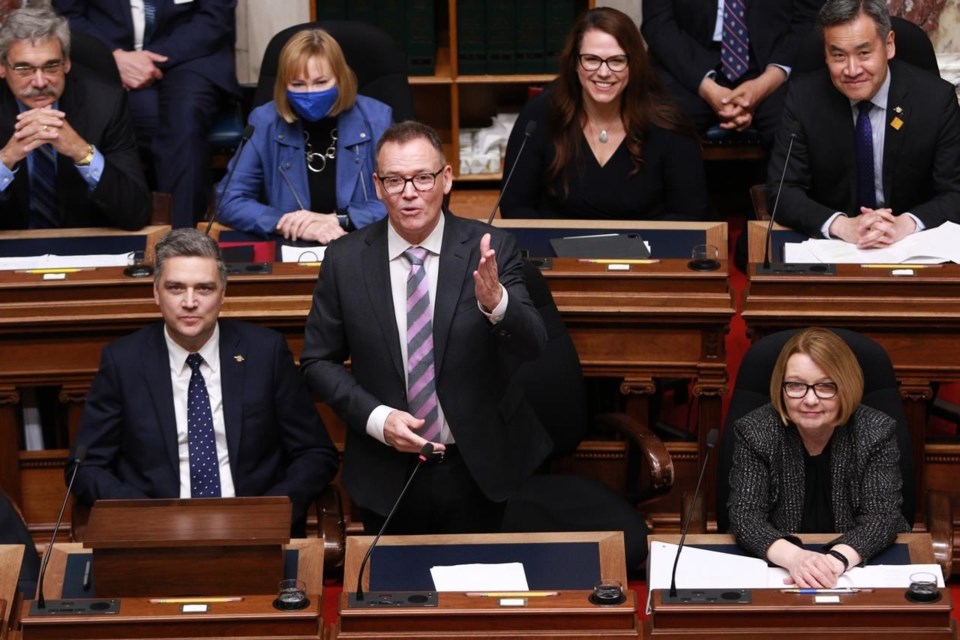VICTORIA — B.C. Premier David Eby says he doesn't mind being told his government's approach to the toxic drug and overdose crisis is too narrow and doomed to fail — he disagrees, but at least it shows his critics are engaged in the crucial discussion.
He says he welcomes a consensus that more needs to be done about an emergency that has cost more than 11,000 lives.
Liberal Leader Kevin Falcon opened the spring sitting of the legislature this week slamming the New Democrat government's approach to mental health and addictions treatment as an "utter failure," prompting a complimentary response from Eby.
"I'm actually grateful that the B.C. Liberals are now saying that the government and public should increase investment in public mental health and addiction treatment," Eby said Friday at a news conference.
"It's a shift in position for them and, frankly, a welcome one," he said. "They were a government that cut those supports and to have them say, 'Look, this is an emergency and we need to be investing more in treatment.' I welcome that. I encourage it."
The overdose crisis debate is expected to continue through the spring as the government highlighted in its throne speech its work on a model of addictions care that moves people from detox to treatment.
B.C.'s Chief Coroner Lisa Lapointe recently reported 2,272 toxic drug overdose deaths in B.C. last year.
At least 11,171 deaths have been attributed to illicit drug toxicity since the public health emergency was declared in April 2016, she said.
Falcon said B.C.'s current plan isn't working and announced a proposal to spend $1.5 billion over three years, if elected, to overhaul addiction services in B.C. and build a recovery system of care.
The next B.C. election is set for the fall of 2024.
The government is too focused on decriminalizing hard drugs like fentanyl, heroin, cocaine and crystal meth and not investing enough in education and treatment, said Falcon.
"We cannot become inured to the fact every year we just keep having record levels of overdose deaths," he said at a news conference. "We can do better, but it's about focusing on rolling up our sleeves and getting down to the hard work of implementing change that's going to deliver different results."
Falcon's plan includes free access to addiction treatment and recovery, the building of five regional addiction recovery centres where people can stay for up to one year and designated living units inside correctional centres for addiction treatment for inmates.
"I never want to hear of anyone that is not seeking treatment because of the barrier of cost," said Falcon.
"Every day we see people on the street who are somebody's parent or sibling or child. The fact we as a society have somehow decided it's OK to leave people on the streets to be exploited and abused, recognizing they are not at this moment in their lives capable of making decisions in their own best interest is a travesty that's got to change."
He said he supports legislation permitting limited use of involuntary treatment for vulnerable youth and adults at risk of harm and facilities with psychiatric and medical supports.
Eby said the government is reviewing the issue of involuntary care and is aiming to find a balance where people get the help they need in times of crisis.
"It's obvious to me we need to do things better in terms of responding to people who are overdosing multiple times in a day," he said. "I've been told by emergency workers this can happen three times in a single day or more."
Falcon said the NDP government's plan must extend beyond decriminalization.
"Their focus is too narrow," he said. "Their focus is on publicly supplied drugs and decriminalization of hard drugs, believing that is somehow going to result in better outcomes. It will not and it will not end well on its own."
Eby said the government's safe supply and decriminalization focus is "really about keeping people alive so they can access treatment."
This report by The Canadian Press was first published Feb. 10, 2023.
Dirk Meissner, The Canadian Press



